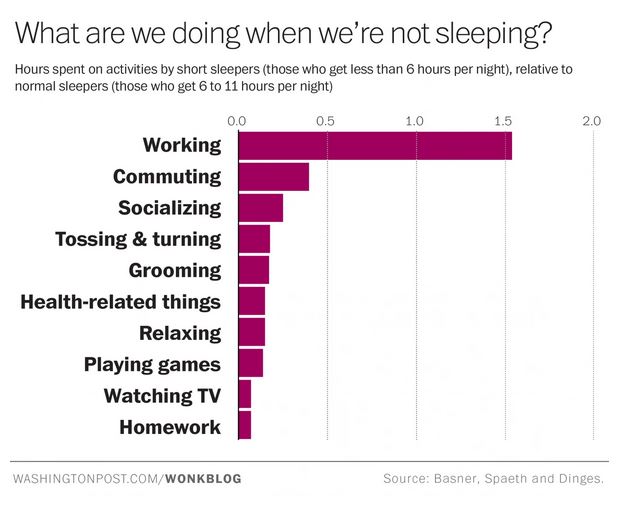21st Century Wire says…
In the 21st century, like every other thing in our lives, something as fundamental as sleep has surprisingly become a ‘commodity’ – to be rationed – rather than an essential human need.
Can man really ration sleep and then medicate for the side-effects with pills, energy drinks, drugs and binge sleeping on the weekends?
The side-effects of this personal policy can be devastating to your health and well-being. According to Web MD, other conditions that might interfere with your day-to-day tasks include sleep deprivation can cause car accidents, drops in IQ, memory loss, increased aging of skin, and loss of sex drive. Aside from these, a chronic lack of sleep can either lead to, or exacerbate the following health conditions:
- Heart disease
- Heart attack
- Heart failure
- Irregular heartbeat
- High blood pressure
- Stroke
- Diabetes
Clearly, there are some serious risks associated with our 24/7, wireless, ‘smart’ culture. Maybe this is just another cost of ‘progress’, or maybe it’s because we simply cannot keep up with the basic costs of living and dozens fees, fines and stealth taxes?
Do you fall into this trend…?

(Image Source: Health Com U)
Americans are trading sleep for work, and it’s literally killing us
Christopher Ingraham
Washington Post
Did you try to catch up on sleep this weekend? You’re not alone. More than one third of American adults report getting less than 7 hours of sleep on weekdays, and many of them try to sleep extra-long on weekends to make up for it.
This isn’t a particularly healthy way to live — insufficient sleep is associated with obesity, high blood pressure, diabetes, and a host of other physical ailments. Drowsy driving causes around 80,000 automobile accidentsevery year, 1,000 of which are typically fatal.
The simple reason for shortchanging sleep on the weekdays? Work. A team of researchers examined nearly 125,000 responses to the American Time Use Survey to calculate two things: first, how much sleep we’re getting, and second, what we’re doing instead of sleeping.
Compared to normal sleepers, so-called “short sleepers” — those who are getting 6 hours or less on weeknights — worked 1.5 more hours on weekdays and nearly 2 hours more on weekends and holidays. Perhaps not surprisingly, “the highest odds of being a short sleeper were found among adults working multiple jobs, who were 61 percent more likely than others to report sleeping 6 hours or less on weekdays,” according to a press release about the study.
To put it another way: to the extent that we’re trading sleep for work, our jobs are literally killing us…
Continue this article at Washington Post
READ MORE HEALTH NEWS AT: 21st Century Wire Health Files
















